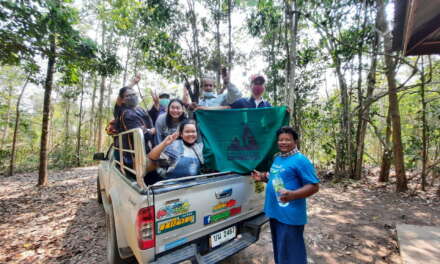31 May 2012 – A letter was delivered today at 13.30 to the Thai Prime, Minister Yingluck Shinawatra, signed by 57 organisations around the world, and 35 individuals, including 11 academics, 2 Members of Parliament and 1 Bishop. The letter is also endorsed by 18 Thai organisations.
The letter (attached) urges the Prime Minister to “stop prosecuting Thai citizens who are engaged in public campaigns for agrarian reform, and to give urgent priority to redistributive land reforms and equitable resolution of the land conflicts to ensure sustainable livelihoods for hundreds of thousands of smallholder communities throughout the country”.
This letter is issued just days before an appeal hearing that could result in the long-term imprisonment of 3 activists/peasant leaders who were involved in the Lamphun community-led land redistribution dating back to the year 2000.
The 3 accused could be facing as much as 4 years imprisonment for their role in community-led redistribution of land in Lamphun, in the culmination of a 9-year long court process.
The Community-led Land Reform Movement took part in mass occupations of disputed lands in various districts of Lamphun and Chiang Mai in the period 1997-2003.
After occupying the lands, the members set up rules for community landholding, including conditions to put the land into production. The main aim of the community land title set up by the movement was to ensure that the land stayed with smallholders, and remained in the hands of the local community.
The rules established by the movement in Lamphun were the model upon which the official community land title was eventually based when this new form of tenure was established ten years later in 2011 by order of the Prime Minister.
The letter also underlines the escalation of state prosecution of villagers and networks fighting for their land rights.
The prosecutions of members of the Lamphun-Chiang Mai reform movements are long-running cases. However in the last few years there have been many prosecutions of Thai people in the process of trying to secure their land rights, as demonstrated by the recent arrests and evictions of members of the Land Reform Network of the Bantad Mountain Range and the Northern Farmers Network.
Sumitchai Huttasan, advisor to the Northern Peasants Federation, said “If reforms were carried out effectively by the government, such as the completion of the process of community title, it would not be necessary for the state to prosecute village people trying to defend their land rights.”
Shalmali Guttal, of Land Research Action Network, one of the coordinators of the campaign, says “We are seeing similar trends of persecutions of local communities by the State in both Thailand and Cambodia. Individuals are given long prison sentences for defending their rights to land, livelihoods and homes. But State forces burn and destroy villages with impunity. This is shocking and completely unacceptable.”
Jacques-Chai Chomthongdi, of Focus on the Global South, another signatory said “the current regime in Thailand is a democratically elected government, which has emphasized its policy to promote the welfare of the poor and rural people. It would enhance the government’s promoted pro-poor agenda if the government could work with progressive grassroots groups and seriously consider their proposals for reform. Unlike short-term election-oriented policies, land reform is one of the fundamental structural reforms needed to resolve the problems of the poor.”
Thailand not only has national obligations to carry out land reform under the Agricultural Land Reform Act, but Thailand has also reaffirmed its “strong belief in the essential role of agrarian reform” on the international stage at the International Conference on Agrarian Reform and Rural Development (ICARRD) of the Food and Agriculture Organization of the United Nations (FAO).
The UN’s Committee on World Food Security (CFS) has recently adopted Guidelines on Tenure of Land, Fisheries and Forests which call on states to conduct redistributive reforms for social, economic and environmental reasons and to recognise and respect customary land tenure.
Sofia Monsalve, of FIAN International, says “The criminalization of peasant leaders acting in defence of their right to land is widespread, not only in Thailand, but worldwide. Paragraph 4.8 of the CFS guidelines urges States to respect and protect the civil and political rights of defenders of the rights of peasants, indigenous peoples, fishers, pastoralists and rural workers.” #
Contacts:
Rebeca Leonard, Land Research Action Network, +66-89-476-6726
Shalmali Guttal, Land Research Action Network, +66-81-375-6409 Email: [email protected]
Fast facts
- The Supreme Court (final appeal) hearing will take place in Lamphun on 6th June 2012
- The 3 defendants are
- Mr Praweis Panpa (64 years), Prabaht village, Pasang District, Lamphun province,
- Mr Rangsan Saensongkhaew (56 years), Raidong village, Pasang District, Lamphun
- Mr Suebsakun Kijnukorn, an activist based in Chiang Mai who worked in support of the community land reform movement
- 3,798 families joined the community land reform movement.
- The area occupied by the community land reform movement is 14,309 rai (2,150 ha).
- “Pasang Community Title” Agricultural Cooperative Ltd was granted community title by the Office of the Prime Minister on 31 March 2011 in one of the areas occupied by the community land reform area in 2000.
- The members of this cooperative are all members of the community land reform movement. One of the representatives of this cooperative, Mr Rangsan Saensongkhaew is one of the defendants awaiting appeal in the Supreme Court on 6th June 2012
Brief timeline of Lamphun-Chiang Mai land struggle:
- In 1984, the Royal Thai government borrowed around $200 million from the World Bank to accelerate land titling in Thailand.
- Around 1987, lands in many districts of the North were titled without the knowledge of local people. Many of the public lands and village commons which were important to the local people, were issued with titles to outsiders. Land titles were also obtained by wealthy investors in state forest reserves and watershed areas, where private landholding is prohibited by law, and in Agricultural Land Reform areas which are supposed to be earmarked for redistribution to poor and landless farmers. Illegalities in the issuing of title have been confirmed by several independent committees.
- With a peak during the early 1990s, there was a boom in large-scale speculative purchase of land in the North. A large number of these titled plots were left idle. Speculators defaulted on their loans in the financial crash, and many of these lands remained in the possession of banks – parcels too large to be affordable to small-scale and poor farmers.
- From 1997, villagers called for the government to investigate the legality of the titles issued and to redistribute lands under the authority of Thailand’s Agricultural Land Reform Act.
- In the period from 1997, and particularly during 2000- 2002, landless farmers joined together in a community land reform movement and carried out occupations of abandoned and disputed lands in their local vicinities. A total of 3,798 families joined the community land reform movement, putting around 14,309 rai (2150 ha) of abandoned land to use.
- The movement put into practice a new form of land tenure which they called a – chanode thi din – community land title, and developed rules and institutions for sustainable management of land.
- The rules under the movement’s community title varied in different communities, but often included the following conditions:
-
- Members must genuinely use the land that they have been allocated. It is forbidden to leave the land abandoned.
- If any member must transfer the land, they must notify the committee in order for the members to consider, and it is forbidden to sell the land to anyone outside the group.
- If there is a transfer of land, a deduction will be made from the income at the rate agreed by all, as contribution to the community land fund.
- Members must join in meetings, fund-raising activities and follow up the resolution of problems, such as the arrests and prosecution of the group or other.
- If the land is transferred, the new plotholder must agree to take responsibility and work with the group in future.
- From 2000, the Northern Peasants Federation (NPF) called for the government to recover privately-held land for redistribution to local communities.
- Studies by the Thai Land Institute Foundation in 2001 revealed that 70% of land for which legal ownership/use documents have been issued in Thailand has been abandoned, left vacant, and not put to productive use, or not fully put to productive use http://bit.ly/KMJHvd.
- In April 2001, NPF secured an agreement from the government to investigate the land-holdings, and begin a pilot land reform project in Chiang Mai and Lamphun provinces.
- In April 2002, however, a Cabinet Resolution was issued to begin prosecuting those involved in the land “encroachments”. This had immediate effect: within days over 300 police officers swept into Baan Dong Khi Lek village in Lampun Province, to arrest villagers on charges of land encroachment. Swoops on other villages followed. At first defendants were refused bail and later bail was set at very high sums.
- By 2003, over 100 small-scale farmers had been arrested in Baanhoeng and Pasang Districts and New Wiangnonglong District of Lamphun province on over 1000 charges.
- In 2006, NPF joined together with the Thai Land Reform Network, to campaign for redistributive reforms for landless peoples, linking the policy of equitable land redistribution to a land fund, progressive land tax and community land title.
- In late 2007, proposals of the Thai Land Reform Network were received by the Thai Government and the following initiatives have been set up: Committee to Facilitate the Resolution of Land Problems in Thailand, chaired by the Prime Minister. A Prime Ministerial Order was issued to officially institute community land title in Thailand 2010. Two community land titles have been issued. The first to the Agricultural Cooperative of Khlongyoeng in Nakonpathom province. The second legally granted community title was to the Pasang Community Title Agricultural Cooperative in Lamphun province. An institute to establish a national land bank was established to facilitate the redistribution of land to low-income and landless farmers. Proposals are also in Parliament to establish a progressive land tax.
Prosecutions in the Lamphun-Chiang Mai land struggle
- So far 22 farmers and movement leaders have been sentenced. These include 20 people from the village of Tha Luk, Nonglong Subdistrict, Wiangnonglong New District, Lamphun province. The other 2 people were from Dongkhilek village, Sritia sub-district, Baanhoeng District, Lamphun province. They were released after 6 months imprisonment on 5th December 2010.
– One person, a villager from Tha Luk, died in prison during his six month sentence.
- On 6th June 2012, there will be a final appeal hearing in the Supreme Court against 3 defendants, including Mr Praweis Panpa (64 years old) from the village of Prabaht, Pasang District, Lamphun province, Mr Rangsan Saensongkhaew (56 years old) from Raidong village, Namdip Sub-district, Pasang District, Lamphun province and Mr Suebsakun Kijnukorn, an activist based in Chiang Mai who worked to support the land movement during the period 2002-2004.
– In the initial trial, all three were sentenced to 6 years in jail.
– Their sentences were reduced by the Court of Appeal to 4 years.
Still to be heard are the cases against another 10 defendants, including 8 people from the village of Phe-tai, Wiangnonglong New District, Lamphun province, and 2 from Raidong village, Namdip Sub-district, Pasang District, Lamphun province.








